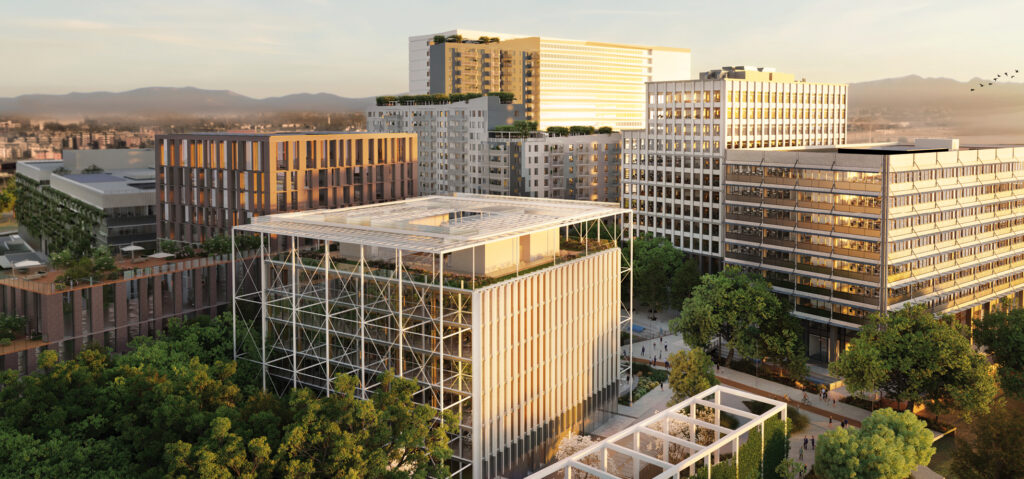The MIND innovation district was born in the Lombard capital, on the area hosting Expo 2015. A major ten-year development project that represents a possible paradigm for other areas of the country as well

Milan builds for the future. MIND, which means Milan Innovation District, is in fact the new biotech district of global ambition that rises on the vast area of EXPO 2015, the Universal Exposition dedicated to food, nutrition and well-being which attracted no less than 21 million visitors. A reality that is on its way to being one of the main innovation hubs in the world, a regional and national excellence in research and development and in industrial production in the biotechnology and agri-food sector.
The new district was born with a strong vocation for Life sciences and intends to become international platform of territorial excellence in research and development relating to biology, medicine, pharmacology, genomics and the convergence of biotechnologies, clinical research, big data and digital technologies.
The district also aims to enhance sustainability in urban life and green mobility and to become a city hub that fosters collaborative innovation, social inclusion and experimentation with sustainable lifestyles in order to create civil, cultural and economic growth, with benefits for the new district and for the entire metropolitan area of Milan.
In fact, MIND can rightly be considered a paradigmatic project, exemplifying a replicable model of collaboration between the public and private sectors. It is based, in fact, on the collaboration between lendlease, a private entity, and Arexpo, a public entity, intending to lay the foundations for the largest innovation district in Italy. An ecosystem based on 5 initiatives (called "anchors") of public interest: the University of Milan (UniMi), the Galeazzi Sant'Ambrogio Hospital, the Human Technopole, the Milan Polytechnic (PoliMi) and the Triulza Foundation , which have attracted public and private stakeholders interested in inhabiting the innovation district and which aim to collaborate to promote new projects that operate in the multidisciplinary and intersectoral innovation paradigm.
The creation of a large research infrastructure, both in terms of laboratories that of weaving of relations, it's a assets single in the Italian technological landscape. The following figures give an idea of the size of MIND:
- 1 million m2 of surface area, with 40 hectares of public open space.
- 10-year construction phase, 99-year concession for Public-Private Partnership underpinning its development.
- 60,000 people who will live and work in MIND when it is fully operational in 2031.
- 4.5 billion euros of public and private investments.
- Over 1,000 researchers in 2022.
The philosophy and strategy of MIND
MIND's analysis is based on the postulate that innovation clusters are defined as “geographical areas where institutions and companies that act as anchors cluster and connect with small businesses, start-ups and business incubators”, which have need for economic externalities beyond the mere co-location of companies and organizations to create a successful research ecosystem. THE innovation districts they grow if they promote cooperation in product research and development, facilitating exchange between key players and leveraging local strengths to address global challenges. All innovation districts possess a combination of economic resources, infrastructural resources and social networking resources, and MIND in particular.
In strategic terms, the district aims to become a hubs dominant in Research biotechnological is biomedical in Europe, leveraging its distinctive scientific and local resources:
- One of the largest public-private partnerships (Lendlease-Arexpo) in Italy for the construction of research infrastructures;
- Research activity of two international Milanese universities (UniMi, PoliMi), treatment and research hospitals (Galeazzi Sant'Ambrogio), research institutions (Human Technopole);
- Presence of international accelerators (Berkeley Skydeck) and incubators (PoliMi, UniMi, Human Technopole);
- Government involvement at national, regional and municipal level;
- A federated model of open, cooperative and competitive innovation;
- Attracting international investment and human capital in Research and Development (R&D);
- A model neighborhood of 60,000 people for intellectual exchange, industrial collaboration, sustainable living;
- Specialization of the Lombardy Region in biological research, medical innovation, private healthcare and STEM training;
- Proximity to Milan, the Italian capital of finance and knowledge, to its 280,000 students and 5 international universities (Statale, Politecnico, Bocconi, Bicocca, Cattolica), and to the lively economy of its metropolitan area (3 million people; 215 million euros of GDP, the third largest metropolitan economy in the EU);
- Excellent transport links (subway, train, airports, highways).
The strategy aims to create a new city neighborhood based on social inclusion, sustainable energy and green mobility at 100%, supporting an innovation ecosystem where private companies, research centres, academic institutions and non-profit organizations for-profit organizations can collaborate, innovate and promote civic engagement.
The value proposition
There value proposition of MIND leverages the unique competitive assets of Milan and Lombardy:
- Interdisciplinary innovation and research specialization (City of the future and Future of health), leveraging the Milanese human capital of students and researchers and the Lombard specialization in biological and medical industries.
- Public and private investments and therefore Public-Private Partnerships (PPP) able to attract further investments and talents.
- A single legal and corporate framework, Federated Innovation®@MIND, the network that facilitates competitive collaboration between anchors, local companies and the integrated network of intermediaries to facilitate collaboration, streamline cumbersome bureaucratic procedures and accelerate commercialization, which has conceived over 100 R&D investment projects in less than 2 years, including 15 projects bringing together MIND's anchors and companies.
- 6 contracts and 30 Memorandums of Understanding (MoU) signed with key intermediaries (including incubators, accelerators, intellectual property experts, technology transfer organizations, venture capital, laboratories).
- Institutional liaison with key policy makers to ensure alignment of R&D investment agenda with priorities at municipal, regional, national and European levels.
- Institutional relationships established with industry associations and relevant stakeholder organizations to advance MIND priorities;
- Platform technologies to facilitate specialization and convergence between disparate sectors and disciplines (e.g. the launch of UniMi's Digital Twin project to facilitate the extraction of health data through 5G technologies).
Key investment in R&D infrastructure
The "anchors" of MIND, i.e. the main public and private promoters, have dedicated considerable resources to the project: UniMi has contributed 340 million euros to the construction of its new scientific campus, Human Technopole has totaled an investment of 1, 4 billion euros, while the Galeazzi Sant'Ambrogio Foundation has made 500 million euros of investments in the construction and medical equipment of the new hospital. These initial investments have been instrumental in supporting the influx of technology companies and innovation projects, attracting research-intensive organizations that look to the long term, be they academic, corporate or institutional.
Likewise, the amount of private investment made by Lendlease is a key indicator of the potential of the new innovation district. Landlease has been awarded the concession contract for the development and operation of MIND for the next 99 years. Lendlease's private development rights cover approximately half of MIND's area, for an estimated final development value of approximately €2.5 billion, bringing the total amount of invested capital to €4.7 billion including public investments.
In July 2021, Lendlease formed a joint venture with the Canada Pension Plan Investment Board (CPP Investments) to invest in an investment fund dedicated to the Italian real estate sector. CPP Investments and Lendlease have agreed a 50:50 joint investment of approximately €400m stake in the Fund to develop and maintain the 150,000sqm property of the 480,000sqm allotted to Lendlease, the West Gate. The total value of the investment for the creation of new innovative spaces such as laboratories, incubators and coworking spaces in this first phase of development amounts to over 85 million euros.
The strong investments of the main tenants of MIND, AstraZeneca, Bio4Dreams, Rold, Illumina, demonstrate theattraction that the district has and its vision to create a cutting-edge biotech hub in Europe.
Federated Innovation and the key players in the consortium
These large investments are put at the service of a new logic of innovation that unites companies in the district, pushing them to collaborate in order to become more competitive externally. To date, Federated Innovation®@MIND comprises 38 enterprises working together in a collaborative environment to accelerate innovation capacity. The total annual contribution of Federated Innovation members is €1,900,000. In the spirit of collaboration that distinguishes the model, UniMi has involved Federated Innovation @MIND companies in all the life science applications presented in the context of the National Recovery and Resilience Plan (PNRR), for a total value of approximately 600 million euros as of April 2022.
While not yet fully operational, MIND has already managed to establish new partnerships, secure competitive funding, channel knowledge and investment to incubate and accelerate new companies and new projects, particularly in the life sciences sector. A selection of the most significant initiatives:
- An innovation team that designs ecosystem support activities together with MIND companies and public anchors in the district.
- Partnership between Lendlease and Politecnico di Milano (PoliMi) to expand the innovation ecosystem (with Lendlease contributing €1 million).
- Berkeley SkyDeck Europe, Lendlease's collaborative international accelerator program with UC Berkeley's Berkeley Skydeck, has opened an office at MIND. The Lombardy Region and the Cariplo Foundation support the initiative with 2.75 million euros.
- Lendlease invests in the MIND ecosystem, through a direct investment in Berkeley SkyDeck start-ups of 1.3 million euros.
- Over 20 million euros raised through competitive grants for R&D infrastructure projects to be developed at MIND, in addition to funding from the PNRR.
- Partnership with Milano&Partners to attract investments, talents and support start-ups.
- Partnership with E.ON to manage energy supply to achieve MIND's zero-carbon goal.
MIND is not only a place for the incubation and acceleration of innovative companies, it is also a place for experimenting with new forms of urban life. The birth of an international district specialized in health, genomics and informatics will lead to the formation of a new neighborhood and a new community which will include doctors, university students, researchers, students, administrative staff, users and inhabitants; it is a unique ecosystem for activating synergies between training, research and innovation.
The economic, environmental and social impact
The PlusValue company and the Milan Polytechnic were commissioned by Lendlease to draw up the first impact assessment of the development of the district with the aim of identifying the actual and expected economic, social, environmental and innovative benefits generated by the project for the various stakeholders in the spaces in which they interact. The impact analysis is conducted on a subset of MIND: Renaissance I (2024), a portion of West Gate, and MIND Village (2023), as they represent the first areas developed and managed directly by Lendlease.
The financial assessment estimates a Financial Rate of Return (FRR) equal to 9.93% in the standard scenario and 10.06% if the maintenance costs of the counterfactual scenario are taken into account. A sensitivity analysis, assuming that all provisions and contingencies are real reductions in cash flow, leads to a FRR of 8.77% and 8.90% respectively.
The economic evaluation demonstrates the positive impact of the project. The Expected Rate of Return (ERR) is equal to 10.50% in the standard scenario (10.63% considering the counter-factual scenario and 10.53% when a conversion factor of 0.99 is applied for the labor component direct costs). Finally, the sensitivity analysis leads to an ERR equal to 9.30% in the standard scenario (or 9.44% considering the counter-factual scenario).
At the national level, the main results show a overall impact on the national product of 877 million euros (219 million euros on average per year) and on the total added value of 347 million euros (a percentage of 39.6% compared to the national product). The employment impact is estimated to be the equivalent of 3,564 and 6,090 full-time jobs, considering only employees or self-employed workers respectively (891 and 1,523 on average per year).
At the regional level, the main results show an overall impact on the product of 414 million euros (138 million euros per year) and an impact on added value of 238 million euros. Estimates of the total impact on employment are between 1,903 and 3,274 full-time equivalent jobs (between 476 and 819 work units on average per year).
A new model of urban sustainability
One aspect that differentiates MIND from most innovation districts around the world is that it is committed to being a neighborhood carbon neutral powered only by renewable 100% energy. Unlike other districts, MIND bases its development on minimization of the ecological impact and on the sustainability of the buildings. The ambition is to become fully decarbonised by 2040. Only electric and sustainable mobility is allowed in the innovation district, since MIND is conceived as a test bed for creating an urban environment with transport infrastructures and built spaces that respond to the imperatives of the ecological transition. MIND has already made progress in developing a smart-grid for highly efficient district heating and cooling. MIND is therefore in line with the environmental policy objectives of the European Green New Deal, which aims to make the entire European Union carbon neutral by 2050. In other words, MIND will be a zero emission zone.
A life cycle approach aims to evaluate the environmental profile of a product (good or service) during its entire life cycle, including the production, construction, use and end-of-life stages. The temporal criterion for evaluating the carbon footprint of the Renaissance I buildings in terms of overall CO2 equivalent emissions is the Design Service Life (DSL), which considers the project throughout its entire life span. The DSL was considered 50 years as the minimum useful life for non-provisional buildings according to the European Commission and in accordance with the framework of the Joint Research Center.
The energy demand of the buildings within Renaissance I will be absorbed by a fifth generation district heating network, designed by E.ON to provide space heating and cooling and domestic hot water service. The appliances that supply thermal energy to the network are powered entirely by renewable energy, using refrigerant gases with a low global warming potential. Furthermore, the proposed building construction systems maximize the prefabrication and modularity of the building, reducing inefficiencies in manufacturing and assembly. Also, by designing for disassembly, the reusability of building materials for other applications is maximized. The estimated energy consumption of buildings in Renaissance I shows that renewable primary energy averages about 89% of the total primary energy consumption (renewable and non-renewable) during the service life of the buildings.
The social impact
The main social impacts produced by the project are grouped according to the relevant Sustainable Development Goals (SDGs) set by the UN at the beginning of the millennium:
- Fair and inclusive economic growth,
- Community cohesion, social inclusion and well-being
- Accessible education and research.
MIND generates a equitable and inclusive growth in three ways: through its sourcing strategy, by promoting impact-driven innovation, and through the MIND Skills Academy program. Lendlease's procurement policy for the development of MIND mandates open bidding to promote fair competition and efficient resource allocation. In addition to typical legal requirements, Lendlease's goods and services procurement policy requires contractors to provide additional assurances and certifications, including a commitment to actively contribute to Program 2121, MIND's job inclusion program for inmates. Furthermore, by dividing the procurement contracts into autonomous lots in line with the size of potential suppliers, Lendlease also favors micro, small and medium-sized enterprises (SMEs) as suppliers, with a goal of 80% participation of local businesses in the construction of MIND .
The project's focus on impact-oriented innovation is primarily advanced through processes of co-creation and co-production between public and private subjectsbut also through initiatives by individual companies and other organisations. At the heart of social innovation is the collaboration between Federated Innovation, the growing network of 38 leading companies contributing to the advancement of joint research and development, and the Social Innovation Academy, which is the physical place within MIND where businesses, non-profit organizations, academia and institutions can meet, build networks and promote socially sustainable innovation. The links between Federated Innovation and the Social Innovation Academy have led to collaboration between research organizations and the Triulza Foundation on two projects: one relating to territorial healthcare planning and the other aimed at promoting the training of managers on sustainability and the impact for healthcare professionals.
MIND Skills Academy was launched by Lendlease in partnership with ELIS and the MIND Village and West Gate contract holders to support the skills development of construction workers and other technical workers. It provides vocational training and job opportunities in construction sites and related industries to enable the unemployed, disadvantaged and low-skilled to improve their working skills. The program has so far attracted 7 industry partners and the first batch of trainees has been selected in Spring-Summer 2022.
Social cohesion, inclusion and well-being
Innovation and cooperation become tangible when the district community is involved, as well as the local communities living next to the new neighbourhood. MIND has so far carried out several community engagement activities, including:
- “10 tables for 100 years of sustainable development” by the Triulza Foundation, an event aimed at gathering the ideas of local communities on MIND and its activities in relation to the needs of the surrounding territories;
- Two surveys presented to employees of companies that are moving to MIND and members of Federated Innovation, in order to understand their needs and expectations;
- 60 structured interviews with the wider regional R&D ecosystem carried out in 2018-2019 to design the district's R&D investment strategy.
Attention to the social welfare of the community is also expressed in terms of urban planning and accessibility, given that MIND was designed according to the principle of the 15-minute city, the new urban planning philosophy that distributes public and commercial services and reorganizes neighborhood mobility to allow all citizens, even the most vulnerable can have easy access to offices, shops and cultural spaces in the neighborhood where they live. First theorized by the current Parisian administration, the principle has spread to many global cities, including Milan.
In line with the 15-minute city, MIND provides the maximum accessibility to people with disability or mobility reduced. To further overcome architectural barriers, in fact Lendlease has planned an intelligent wayfinding project that includes solutions such as chromatic signage and real-time data, multi-sensory panels and soundscapes to intuitively direct people – and in particular people with disabilities – along the routes of the district. Compared to any other urban redevelopment project in the Municipality of Milan, MIND has higher coefficients in relation to areas accessible to the public (72% instead of 47%), areas for leisure (15.5% instead of 13%), areas equipped for sports ( 3% instead of 0.9%), green areas (18% instead of 6%) and community areas (13% compared to 3%).






